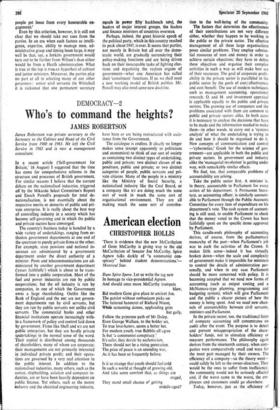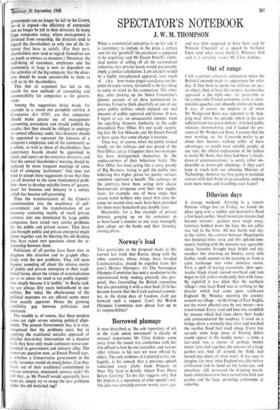Who's to command the heights?
DEMOCRACY-2 JAMES ROBERTSON
James Robertson was private secretary to the Secretary to the Cabinet and Head of the Civil Service from 1960 to 1963. He left the Civil Service in 1965 and is now a management consultant.
In a recent article (`Self-government for Britain,' 16 August) I suggested that the time has come for comprehensive reforms in the structure and processes of British government For similar reasons I believe that the current debate on the nationalised industries, triggered off by the Mikardo Select Committee's Report and Enoch Powell's proposals for total de- nationalisation, is not essentially about the respective merits or demerits of public and pri- vate enterprise. It is really about the best way of controlling industry in a society which has become self-governing and in which the public and private sectors have converged.
The country's business today is handled by a wide variety of undertakings, ranging from or- thodox government departments at one end of the spectrum to purely private firms at the other. For example, state -pensions and national in- surance are administered by a government department under the direct authority of a minister. Posts and telecommunications are ad- ministered by another government department (yours faithfully') which is about to be trans- formed into a public corporation. Most of the fuel and power industries are run by public corporations; but the oil industry is run by companies, in one of which the Government owns a large shareholding. Outfits like the Bank of England and the BBC are not govern- ment departments run by civil servants, but they are run by public servants not unlike civil servants. The commercial banks and other financial institutions operate increasingly with- in a framework of policy and control laid down by government. Firms like Shell and to are not public enterprises, but they are hardly private undertakings in the normal sense of the word. Their capital is distributed among thousands of shareholders, many of whom are corporate; their managements are not primarily interested in individual private profit; and their opera- tions are governed by a very real attention to the public interest. In addition to the nationalised industries, many others, such as the cotton, shipbuilding, aviation and computer in- dustries, are or have been heavily dependent on public finance. Yet others, such as the motor industry and the eleCtrical engineering industry, have been or are being restructured with assis- tance from the Government.
The catalogue is endless. It clearly no longer makes sense (except apparently to politicians and economists) to think of our sort of society as containing two distinct types of undertaking, public and private; two distinct classes of ex- penditure, public and private; or two distinct categories of people, public servants and pri- vate citizens. Many of the people in a ministry like the Ministry of Social Security, a nationalised industry like the Coal Board, or a company like to are doing much the same sort of work in much the same sort of organisational environment. They are all making much the same sort of contribu- tics to the well-being of the community. The factors that determine the effectiveness of their contributions are not very different either, whether they happen to be working in the public or the private sector. The effective management of all these large organisations poses similar problems. They employ substan- tial resources of men and money in order to achieve certain objectives; they have to define these objectives and organise their complex activities in such a way as will make best use of their resources. The goal of corporate profit- ability in the private sector is paralleled in the public sector by the goals of cost/effectiveness and cost/benefit. The use of modern techniques such as management accounting, operational research, 0. and M. and investment appraisal is applicable equally to the public and private sectors. The growing use of computers and the problems associated with them are common to public and private sectors alike. In both cases it is necessary to analyse the decisions that have to be made and the information needed to make them—in other words, to carry out a 'systems analysis' of what the undertaking is trying to do and how it should be organised to do it. New concepts of communication and control =cybernetics,' Greek for the science of gov- ernment—are applicable in both the public and private sectors. In government and industry alike the 'managerial revolution' is getting under way, with remarkably similar effects.
We find, too, that comparable problems of accountability are arising.
Take the public sector first. A minister is, in theory, accountable to Parliament for every action of his department. A Permanent Secre- tary, as accounting officer, is similarly account- able to Parliament through the Public Accounts Committee for every item of expenditure on his department's vote. The cash system of account- ing is still used, to enable Parliament to check that the money voted to the Crown has been faithfully spent on the specific items approved by Parliament.
This candle-ends philosophy of accounting derives, of course, from the parliamentary monarchy of the past—when Parliament's job was to curb the activities of the Crown. It makes little sense—indeed it has virtually broken down—when the scale and complexity of government make it impoSsible for ministers to control the details of administration per- sonally, and when in any case Parliament should be more concerned with policy. It is becoming accepted that we need new forms of accounting (such as output costing and a McNamara-type planning, programming and budgeting system), which will give Parliament and the public a clearer picture of how the money is being spent. And we need-new chan- nels of accountability between civil servants, ministers and Parliament.
In the private sector, too, the traditional form of company accounting still concentrates on audit after the event. The purpose is to detect and prevent misappropriation of the share- holders' funds, not to stimulate efficiency or measure performance. The philosophy again derives from the nineteenth century, when com- panies were comparatively small and were for the most part managed by their owners. The efficiency of a company-7so the theory went— could safely be left to the owner-directors. They would be the ones to suffer from inefficiency; the community would not be seriously affected and, if the worst came to the worst, the em- ployees and customers could go elsewhere.
Today, however, just as the efficiency of government can no longer be left to the Crown, So—it is argued—the efficiencY of companies can no longer be left to their directors. In many large companies today, where management is divorced from ownership, the directors tend to regard the shareholders as only one of the in- terests they have to satisfy. (For their part, shareholders now tend to regard themselves not so much as owners as investors.) Moreover, the well-being of customers, employees and the community at large is now so dependent on the activities of the big company that the direc- tors should be made accountable to them as well as to the shareholders.
This line of argument has led to the search for new methods- of accounting and accountability for companies as for govern- ment.
Among the suggestions being made, for example in a recent PEP pamphlet entitled A Companies Act 1970?, are that companies should make greater use of management accounting procedures and should publish the results; that they should be obliged to undergo an annual efficiency audit; that directors should be appointed to represent the interests of a company's employees and of the community as a whole, as well as those of shareholders; that supervisory boards should be appointed to check and report on the executive directors; and that the annual shareholders' meeting should be replaced by more frequent meetings of some kind of company 'parliament.' One does not need to accept these suggestions to see that they are all directed to the same fundamental prob- lem—how to develop suitable forms of 'govern- ment' for business and industry in a society which has become self-governing.
Thus the transformation of the Crown's administration into the machinery of self- governmeni, and the transformation of an economy consisting mainly of small private ventures into one dominated by large public companies, have raised very similar problems for the public and private sectors. They have also brought public and private enterprise much closer together and, by blurring the old dividing line, have raised new questions about the re- lationship between them.
Politicians of all parties have been slow to diagnose this situation and to grapple effec- tively with the new problems. They still seem happier sounding off about the relative merits of public and private enterprise in their tradi- tional forms, about the virtues of nationalisation per se or about the need to cut public expendi- ture simply because it is 'public.' As Burke said, we are always fifty years behindhand in our politics. But today the obsolescence of the political nostrums we are offered seems more than usually apparent. Hence the growing credibility gap between politicians and electorate.
The trouble is, of course, that these modern issues cut right across existing political align- ments. The present Government has, it is true, recognised that the problems exist, but in applying the traditional socialist approach of detailed day-to-day intervention on a massive scale they have only made confusion worse con- founded in government and industry alike. The important question now, as Enoch Powell says, is whether a Conservative government in the early 'seventies would do muckbetter. Can they break out of their traditional commitment to private enterprise, nineteenth century style? Or will they, as Mr Powell would apparently have them do, simply try to sweep the new problems under the old doctrinal rug?











































 Previous page
Previous page